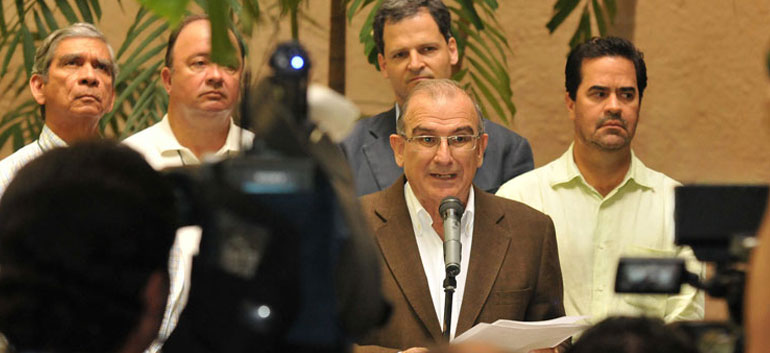With no consensus emerging on the topic of political participation, the second in a six-point negotiation schedule between the Colombian government and the FARC rebel group, the country’s largest, negotiators decided to extend dialogues on a running basis until an agreement is reached.
The 16th round of the Havana peace talks was supposed to end last Thursday with a deal to open a pathway for the FARC to demobilize and establish itself as a legitimate non-violent political party.
Caracol Radio reported Sunday that the end of this round would not end until the negotiating teams had agreed upon the rebels’ political participation. Neither the FARC nor the government negotiation team have either confirmed or denied this.
But as of Monday night, the end of the initial dialogue extension, no deal had been made, and the talks were once again extended, this time on what one source told the Colombian press was a “day-to-day” schedule.
MORE: 2-day extension of current round of FARC peace talks suggests significant progress
Previously, this week was supposed to serve as part of a 10-day break period before the start of the next round of talks, and the opening of the “illicit drug” discussion point.
But now it is unclear how long the parties will have to remain in meetings before they can reach an agreement on the political participation question and move on with the greater negotiation schedule.
November 19th will mark one year since the start of the Havana peace talks. Originally, Colombian President Juan Manuel Santos was calling for the entire negotiation to end prior to the one-year anniversary; now he is on record as saying he expects a settlement on the second point of six negotiation topics before the November 19th landmark.
The slow pace of negotiations thus far has given critics of the peace talks additional grounds to question the intentions of the rebels. Opponents such as ex-President Alvaro Uribe have redoubled their rhetoric in recent weeks, attempting to depict a FARC upper command that is stalling for time, while enjoying a “paid vacation” in the Cuban capital.
MORE: Uribe Stirs Anti-Peace Talks Sentiment By Publishing Candid Photos Of FARC
FARC leaders, meanwhile, have repeatedly rejected efforts to place any concrete timeline on discussions, which they claim cannot continue in good faith under such artificial pressures.
With a national election cycle quickly approaching, the issue of the peace talks is expected to be dragged into the political arena, and President Santos will be keen to show progress in what has been the defining policy decision of his presidency.
The FARC has yet to release any public statements regarding the new extension, and indications from either side regarding how close the parties are to an agreement have not been forthcoming.
So far the only topic that has been resolved is agricultural reform, the original impetus for the FARC’s nearly 50-year rebellion in 1964.


